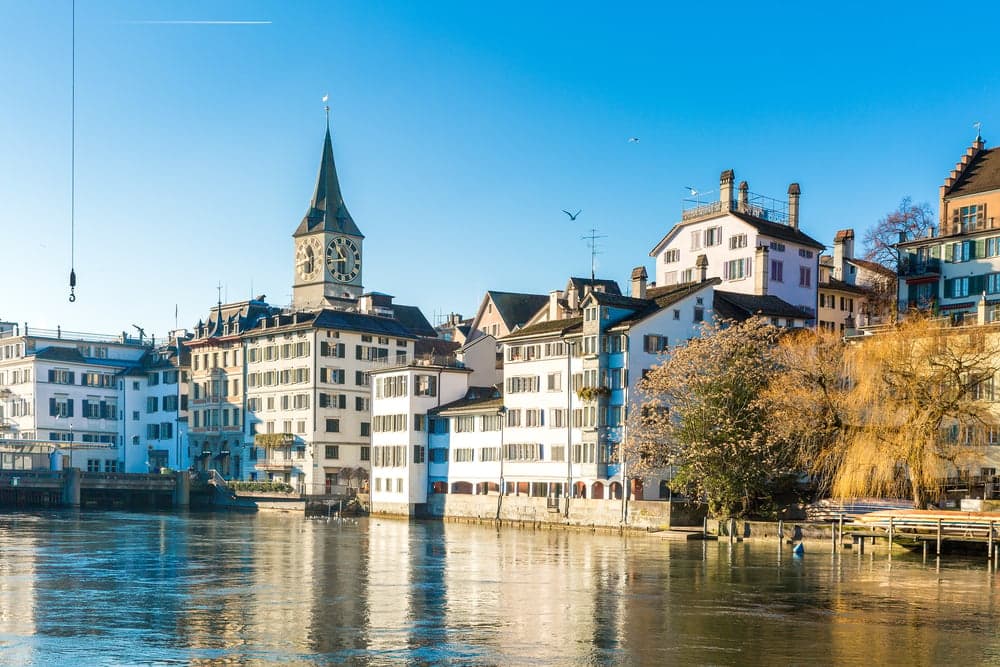Switzerland is a country known for its spectacular mountains, watches, chocolates and cheeses, but also for its cultural and linguistic diversity. Its 8 million inhabitants live in a relatively small territory of just over 41,000 km², comparable to Extremadura or the Netherlands, which is home to a wide variety of languages reflecting its rich history and geography.
What languages are spoken in Switzerland?
Official languages of Switzerland
German
The mother tongue of more than 60% of the inhabitants is Swiss German (or Schwizerdütsch), and Standard German (Hochdeutsch) is understood by about 80% of the population. Its territorial distribution covers northern, eastern and central Switzerland. Swiss German is a set of highly differentiated variants of the German language, to the extent that some of these dialects can be difficult to understand even among different regions of Switzerland. As a result, Standard German is the language taught in schools and the standard language of the German-speaking media, while Swiss German occupies the more informal spaces.
French
French is the second most widely spoken native language in Switzerland; about 22% of the population considers itself French-speaking, although 50% of the Swiss know the language. Its speakers are located in the western part of the country. Swiss French is a dialectal variant much closer to the French of France.
Italian
The southeastern part of Switzerland concentrates the majority of Italian speakers, who represent 10% of the Swiss population. Despite having its own variant, the adoption of Swiss Italian is a relatively recent phenomenon. It was incorporated during the last century, as the corresponding populations previously used the Lombard language, which still persists in more rural regions.
Romansh
Romansh is a standardized set of five linguistic varieties from the canton of Graubünden in the southeastern part of the country. It is the largest and least densely populated canton, and the only region where Romansh is a co-official language, along with German and French. Its total number of speakers is around 40,000, making it the official minority language of Switzerland, with less than 1% of the population using it.
Other languages spoken in Switzerland
Interestingly, the official and most widely spoken languages in Switzerland today do not correspond to the languages traditionally spoken in the country, which, despite their similarities with these predominant languages, have evolved differently and have their own characteristics that set them apart.
Arpitan or Franco-Provençal
Historically, in the French-speaking area, Arpitan or Franco-Provençal was spoken, another Gallo-Romance language that has currently been declared endangered by UNESCO. Arpitan continues to be spoken in parts of France, Italy, and Switzerland, although it is only spoken sparsely by about 200,000 people, mainly in the Valle d’Aosta (Italy).
Western Lombard
Western Lombard or Insubric is a language traditionally spoken in northern Italy, although its use is decreasing day by day in favor of standard Italian. It is currently classified as an endangered language and is not official in any of the regions where it is spoken. Despite this, the language is better preserved in Switzerland, where it is used more frequently and is promoted in radio and television programs. Even so, Lombard in Switzerland is also facing a decline among the younger generations who use more standard Italian.
Yenish
A variant of the German language, closer to a jargon than a complete language, it consists of unique and specialized words but lacks its own grammar. This language is used by the Yenish (from the German Jenischen), a formerly semi-nomadic people found mainly in Germany and surrounding countries. Of all these countries, only Switzerland recognizes the Yenish as a national minority. Their vocabulary incorporates Yiddish and Romani words and is usually combined with the local dialect of German. Over the years, its number of speakers has declined substantially, and today it can only be heard in isolated localities or in very specific urban districts.
Foreign languages in Switzerland
In addition, speakers of other foreign languages can be found due to the cultural diversity of the country. An estimated 20% of Switzerland’s population is made up of foreign temporary workers, with a notable proportion coming from Italy, Turkey, and the former Yugoslavia. It is also common to hear English, which is considered the fourth most spoken language in Switzerland, along with Spanish and Portuguese, which have large migrant communities in Swiss cities.
Diglossia in Switzerland
As we can see, most people in Switzerland are forced to speak more than one language from an early age. More than half of the population is bilingual between German and French, and almost all inhabitants are multilingual to a greater or lesser degree in one language or another.
What is even more surprising is the significant degree of diglossia that can be found between the varieties of each language. Diglossia refers to the coexistence of two or more linguistic varieties in the same territory. In this case, there is a split of functions between the standard variety and the Swiss variety. While the Swiss variety of German, French, or Italian are often the native languages of the population and are commonly spoken on the streets and in personal relationships, these languages cast aside for written language and official documentation where the standard variant of the language is used. Curiously, Switzerland is one of the few countries where there is no desire to unify or replace the vernacular language with the official language, and the country’s native varieties have been kept alive.
Legal status of languages in Switzerland
The Swiss Constitution recognizes German, French and Italian as “national and official languages” at the federal level, while Romansh is also considered an official language, but only in relations with its speakers. These languages have a legal status recognized in the Swiss Constitution and are used in the political, administrative, and educational spheres of the country. Each of Switzerland’s cantons, the country’s territorial organization, is free to set the official language of its region. Most cantons have only one official language.
The only cantons with official bilingualism (German and French) are the canton of Bern, the canton of Fribourg, and the canton of Valais, while in the canton of Graubünden, German, Italian, and Romansh are the three official languages. As there may be several languages in certain cantons, their officiality is not shared equally throughout the territory, but the different districts or communes determine their own official language. That is, these multilingual cantons are organized into smaller monolingual communities.
Nevertheless, some exceptions to this monolingual official status can be found, such as the city of Fribourg, where German and French are co-official, and in the canton of Graubünden, where the official status of Romansh always goes hand in hand with German.
Current language situation in Switzerland
The linguistic situation in Switzerland has evolved in the 21st century. Although German remains the predominant language in most cantons, French has gained importance in cities such as Geneva and Lausanne, where it is widely spoken. Italian is mostly spoken in the canton of Ticino, and Romansh remains in some areas of Graubünden.
As can be seen, Switzerland is a multilingual and multicultural country, where linguistic diversity is an integral part of its identity. The official and most widely spoken languages in Switzerland reflect the history and cultural influences present in different regions of the country. This linguistic and cultural richness makes Switzerland a fascinating place to explore and discover.
If you are interested in improving your internationalization strategy or need translation services for one of the languages spoken in Switzerland or into any other language, at iDISC, a translation agency, we can help you. We have a team of professional localization experts and native translators so that your message can penetrate the heart of each target market. Feel free to contact us for further information on how we can help you expand your global presence.





